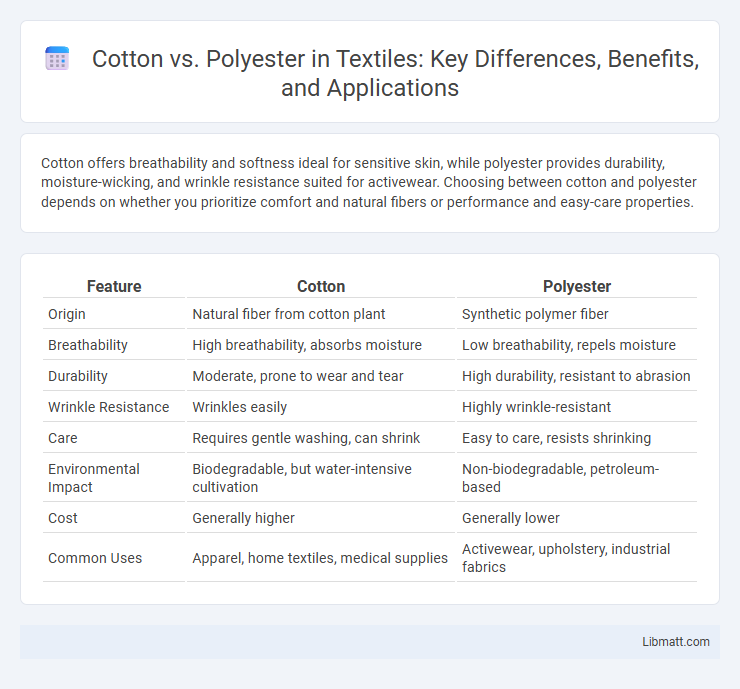Cotton offers breathability and softness ideal for sensitive skin, while polyester provides durability, moisture-wicking, and wrinkle resistance suited for activewear. Choosing between cotton and polyester depends on whether you prioritize comfort and natural fibers or performance and easy-care properties.
Table of Comparison
| Feature | Cotton | Polyester |
|---|---|---|
| Origin | Natural fiber from cotton plant | Synthetic polymer fiber |
| Breathability | High breathability, absorbs moisture | Low breathability, repels moisture |
| Durability | Moderate, prone to wear and tear | High durability, resistant to abrasion |
| Wrinkle Resistance | Wrinkles easily | Highly wrinkle-resistant |
| Care | Requires gentle washing, can shrink | Easy to care, resists shrinking |
| Environmental Impact | Biodegradable, but water-intensive cultivation | Non-biodegradable, petroleum-based |
| Cost | Generally higher | Generally lower |
| Common Uses | Apparel, home textiles, medical supplies | Activewear, upholstery, industrial fabrics |
Cotton vs Polyester: An Overview
Cotton, a natural fiber derived from the cotton plant, offers breathability, softness, and moisture absorption, making it ideal for comfortable, everyday wear. Polyester, a synthetic material produced from petrochemicals, excels in durability, wrinkle resistance, and quick-drying properties, suitable for activewear and outdoor gear. Your choice between cotton and polyester depends on the balance you seek between comfort and performance in your clothing.
Origin and Production Processes
Cotton originates from the natural fibers of the cotton plant, harvested and spun through mechanical ginning and carding processes that emphasize sustainability and biodegradability. Polyester is a synthetic fiber derived from petrochemical polymers, produced via polymerization and melt spinning techniques, resulting in durable and moisture-resistant fabrics. Your choice between cotton and polyester depends on preferences for natural origin versus engineered performance and environmental impact.
Comfort and Feel Comparison
Cotton fabric offers superior breathability and softness, providing a natural, comfortable feel that adapts well to body temperature changes. Polyester, while less breathable, excels in moisture-wicking properties, making it ideal for activewear by keeping skin dry during exercise. The choice between cotton and polyester often depends on the balance between comfort in casual wear and performance in sports or outdoor activities.
Durability and Longevity
Polyester fibers exhibit superior durability compared to cotton due to their synthetic composition, which resists stretching, shrinking, and abrasion. Cotton, while breathable and comfortable, tends to weaken and wear out faster with repeated washing and exposure to sunlight. Blended fabrics combining cotton and polyester enhance longevity by balancing softness with resilience, making them ideal for long-lasting clothing and upholstery.
Breathability and Moisture Management
Cotton fibers naturally allow air circulation, enhancing breathability and keeping your skin cool, while efficiently absorbing moisture but drying slowly. Polyester, engineered for activewear, wicks sweat away from the body and dries rapidly, preventing dampness during intense activity. Prioritizing breathability and moisture management depends on your activity level and climate preferences.
Environmental Impact and Sustainability
Cotton cultivation demands significant water resources and often involves pesticide use, contributing to environmental concerns such as soil degradation and water pollution. Polyester, derived from petroleum, is energy-intensive to produce and contributes to microplastic pollution during washing, impacting marine ecosystems. Sustainable alternatives include organic cotton and recycled polyester, which reduce environmental footprint by minimizing chemical use and lowering resource consumption.
Maintenance and Care Differences
Cotton requires regular washing at moderate temperatures and benefits from ironing to maintain softness and shape, while polyester is more resistant to wrinkles, stains, and shrinking, allowing for easier low-maintenance care. Cotton fabrics are prone to shrinking and fading over time due to frequent washing, whereas polyester's synthetic fibers retain color and structure longer under similar conditions. Proper care for cotton involves gentle detergents and air drying to extend fabric life, contrasting with polyester's compatibility with machine drying and heavy-duty detergents without damage.
Cost and Affordability
Cotton is generally more expensive than polyester due to higher production costs and slower growing cycles, making polyester a more affordable option for budget-conscious consumers. Polyester, a synthetic fiber, is mass-produced from petrochemicals, resulting in lower material and manufacturing expenses, which translates into cheaper prices for clothing and textiles. Cost efficiency and durability make polyester a preferred choice in large-scale apparel production where affordability is a priority.
Best Uses and Applications
Cotton excels in breathability and moisture absorption, making it ideal for casual wear, summer clothing, and sensitive skin products. Polyester offers durability, wrinkle resistance, and quick-drying properties, commonly used in activewear, outdoor gear, and upholstery. Your choice depends on whether comfort and natural fibers or performance and longevity are more important for the intended application.
Choosing Between Cotton and Polyester
Choosing between cotton and polyester depends on your priorities for comfort, durability, and care. Cotton offers breathability and softness, making it ideal for sensitive skin and warmer climates, while polyester provides moisture-wicking properties and greater resistance to wrinkles and shrinkage. Your decision should consider fabric performance in terms of maintenance and environmental impact relevant to your lifestyle.
Cotton vs Polyester Infographic

 libmatt.com
libmatt.com